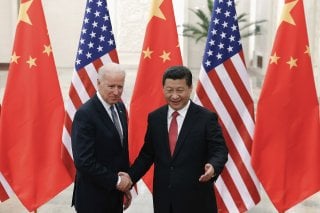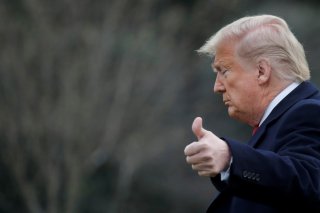
Our first doctor appointment this year came before the lockdown; the latest, after the world changed. I was there for the first, alongside my wife and little boy. For the last, I had to wait outside in the car, keeping my son occupied, while my wife went in alone.
I wasn’t explicitly told to stay away; we had to guess the right thing to do. Should I have gone in, and risked exposing myself and our child to the coronavirus? Might, in fact, one of us have had it—what if we exposed others? Unsure, we stayed apart. Ours is just one experience of many that have, over these past few weeks under lockdown, illustrated changes in people’s lives both small and large: operations canceled, business orders put on hold, companies bankrupted, staff furloughed, loved ones lost.
We can already see the bargain that societies are willing to strike for a return to normality changing. What used to be unthinkable is now anything but; the illiberal policies of yesterday are repackaged as the liberating innovations of tomorrow. Immunity certificates, mass testing, government surveillance, and a volunteer army of contract-tracing officials are no longer the policies of a police state, but ones to restore basic freedoms. Would I now approve of being scanned, tested, and having my prior movements and contacts traced if it meant I could go into the doctor’s office with my wife? Of course. How would I have responded to the suggestion before the pandemic hit? With incredulity.
In Britain, across Europe, and in parts of the United States, as we consider how to ease out of our collective states of emergency and prevent further spikes of infection, much of the policy focus has centered on the trade-offs between public health and the economy. Less attention, however, has been paid to what we risk permanently losing, whichever way we exit. Not only might the economy atrophy, but also the norms that hold our societies together: the expectation that we all enjoy the same basic freedoms, rights, and obligations that underpin the way we interact with one another—and, ultimately, with the authorities. What are we free to do by right? Who gets to decide? What private information do I have to share? And with whom?
The British government is already significantly more powerful than it was just weeks ago, having won extraordinary new tools to deal with the threat—the police, for example, patrol parks and roads, imposing new social-distancing rules. The government enacted a set of sweeping regulations more invasive in scale and scope than anything attempted in modern peacetime, banning everyone from leaving their home without a “reasonable excuse” (though these measures were relaxed slightly this week). And it did so without a vote in Parliament. In 1215, the Magna Carta established the right to travel freely without fear of arbitrary detention. Yet, in these regulations, that right appeared to have been taken away. House detention was the presumed starting point; the freedom to leave one’s home a privilege awarded on the basis of epidemiological calculation—whether you are fit, healthy, or young enough to do so safely.
Freedom and the norms of behavior that bind us are too easily thought to be either protected or felled in one go. In fact, they are far more likely to be lost in events, swallowed gradually, like trees in ivy. This process can happen voluntarily and temporarily, in response to threats and emergencies when liberty is sacrificed. But it can also happen through decay, as old freedoms, privileges, or norms fail to adapt, and lose public consent, their costs seen as too high to maintain.
The challenge ahead is to adjust to the new world that COVID-19 is creating, to address our physical vulnerability in ways that carry public support. We don’t yet know whether the liberal democratic system is strong enough to meet this challenge. Even old oaks can be hollowed out. History, though, suggests that it is more robust than assumed, its norms of behavior stronger, more deeply rooted, and enduring than appearances suggest. We are stronger than we think.
Norms—the rules and assumptions underlying interactions among individual citizens, and between citizens and the state—are the oil in the engine of a nation. No country is entirely governed by a written constitution, not even a nation with such a foundationally significant document as the United States. In Britain, which has no singular written constitution, the importance of these norms is foundational. For example, no document sets out the line of succession if a British prime minister is incapacitated, as Boris Johnson was in April. Indeed, the very role of the prime minister exists in its current form only because of convention, yet it is so deeply rooted that it is among the most powerful executive positions in the world.
The British state itself is similarly veiled in convention and ceremony, its power and legitimacy ultimately rooted in public consent rather than force. This is Britain’s grand bargain: authorities only as powerful as their legitimacy—very powerful at times, very weak at others. Consent is a measure that naturally ebbs and flows with events and the government’s handling of them. It can produce the force and certainty of Margaret Thatcher, and the calamitous vacuum of Theresa May.
The very ties that bind the state’s power, though, also reinforce it. When public consent for its authority exists, expressed with a solid majority in the House of Commons, there are few limits on the British executive; its power is constrained only by politics and convention, a liberal political culture, and established, albeit comparatively weaker, institutions. And while customs, conventions, and norms are traditionally seen as guarantors of stability, they can also be used as tools of change. The historian Peter Ackroyd writes in Foundation, a history of England, that custom is the “essential feature” of the country. Instead of fighting customs, skillful rulers in British history have used them to advance new ends. “Any institutional or administrative change, introduced by the king and council, had to be explained as a return to some long-lost tradition,” Ackroyd writes. “Any innovation that had endured for twenty or thirty years then in turn became part of ancient custom.” Thus, the British constitution weaves back through time, each knot connected to something before, but always changing. The Bill of Rights of 1689, establishing the supremacy of Parliament, is connected to the Magna Carta, which itself, Ackroyd writes, is linked to a “haphazard collection of principles” that existed before that. Change is veiled in continuity.
Today, new norms are being established, executive powers exercised, and police guidance issued. In time, case law will develop, legislation will be passed, political pledges made, and national stories told. Changes, adaptations, and innovations will imprint themselves on our collective consciousness. Many of these powers and ways of working will outlast the current moment and apply to the next in ways we cannot foresee.
Through the course of this lockdown, then, innovations risk stealthily becoming part of our established way of life because we have become used to them and have (temporarily) consented to their introduction: digital surveillance, perhaps, or police drones. At their most fundamental, these changes might also mean the normalization of freedom being enjoyed by some and not others for reasons of biology rather than behavior.
“The risk in situations like this is, you get used to it,” David Davis, a libertarian and former Conservative cabinet minister, told me. “When we get to the end of this pandemic, [the authorities] will talk about the next pandemic and will be unwilling to get rid of the powers they’ve now got. Whenever you get into one of these situations, there’s a danger of an involuntary reset—a reset of our constitutional standards, in which some norms get wiped.”
We are only just beginning to see the array of trade-offs and choices we may soon be forced to make, in order to ensure we are tolerably free and tolerably safe. How is a society to ensure that new classes are not created—the sick and healthy, vulnerable and invulnerable, old and young, salaried and self-employed? How can we ensure that freedom guaranteed equally under the law is not abandoned in the race to reestablish a sense of normality for the majority? What if there is no vaccine? How do we ensure that established patterns of emergency behavior do not become normalized powers left in the statute book, free to be abused in an unrelated crisis?
The danger is that the national story of ancient English freedom built on public consent provides false security, not real protection—a Maginot Line that doesn’t meet the challenges of modern-day pandemics and technology. Laws are easily unwound, but norms lost are harder to bring back, especially if the public itself has consented to their removal.
“We’re taking away the ancient, inalienable right of freeborn people of the United Kingdom to go to the pub,” Johnson declared as he reluctantly ordered a lockdown on his country. Britain’s leader, for his many faults, is not Viktor Orbán, or even Donald Trump. If anything, his critics argue, this is a government and a prime minister too wedded to freedom, too reluctant to impose the lockdown, and, ultimately, officials worried, facing a public too unwilling to give up its individual liberties for a collective national effort.
Britain’s lockdown, and the system to enforce it, is based in law, not arbitrary imposition, and has been enacted using conventional tools with safeguards: Lawmakers had to give their assent within 28 days, the government must review the restrictions every three weeks, and the emergency legislation contains sunset clauses. Certificates are not required to leave home, parks have largely remained open throughout, the public itself has been asked to use common sense in deciding what is a necessary excursion—and the authorities required to use the same in enforcement.
If this is the slippery slope to a police state, it appears to be a very British police state—mild, moderate, not very threatening, and one that promises to hand back its sword once the fighting is over.
What is striking about today’s national debate in Britain, as opposed to the United States, is the almost universal acceptance that the state will hand back its sword, or at least put it away once the crisis has passed. Britain has, after all, been here before—government power unsheathed then voluntarily put back in its cover. The 1939 Emergency Powers Act granted the wartime government extraordinary powers to rule by decree, acquire property, and detain without trial. Winston Churchill became prime minister without an election and was granted virtual dictatorial powers. Then, just after his greatest triumph, Churchill was removed from power, and the Emergency Powers Act that made him the most powerful prime minister in history was repealed (the latter not until 1959, though).
Johnson has not been empowered to the same extent as Churchill was, nor is today’s threat as grave. The extent to which broad support exists for the lockdown and for government powers to track and surveil the population is revealed in the bipartisan support these measures have received. Shami Chakrabarti, the former director of Liberty, a British civil-rights group that fought a long-running battle against a previous government’s attempts to introduce new anti-terrorism powers, told me she was “not remotely as fearful” for individual freedoms now as she had been just after September 11, when Western governments began more actively snooping on their citizens. “The danger of something like a war on terror was we were told there was this existential threat, for which we needed to give up our privacy, and other values, wholesale until the war was over, without ever being able to verify when that would be,” Chakrabarti, now a member of the House of Lords, said. The problem was that terrorism had long been a threat, and would continue to be a threat, so such a war would always exist, creating a new normal. The difference with the pandemic, she said, is that whether the tactics are working, and when the coronavirus is defeated, will likely be clear.
Tracking and tracing individuals infected with COVID-19 would be reasonable, given the risk, even necessary, Chakrabarti said—personal information is already gathered and used to collect taxes or fight crime, so the same is justified in this crisis. “People will [accept] it if they think it’s necessary and proportionate, that it is not being abused for a raft of unrelated purposes,” she told me. “In the language of human rights, they want interference with qualified rights to be necessary and proportionate.” People have not been staying in their homes just because they’ve been told to do so, Chakrarbarti said, “but because they think it’s justified.”
To put it another way, the public consents.
Given the foundational role of consent in Britain, the greater danger to civil liberties as the pandemic plays out might come not from the government, but from the public. Faced with an extraordinary threat to their security, might not the people be far more supportive of illiberalism than assumed, particularly if it is perceived to apply only to a minority—the sick or vulnerable, say?
Here we arrive at one of the defining realities of this challenge. Johnson, a reluctant draconian, is also the most powerful domestic politician since Thatcher and, because of the pandemic, has been granted powers over life and death, both literally and economically, by a public looking for protection. To an extraordinary degree, the decisions made by one man in the next few months will dominate British life for years, if not decades, to come. Cabinet-government and parliamentary scrutiny have not been removed, but Johnson’s personal dominance, as well as his personal experience of COVID-19, gives him unique authority in a unique moment.
Johnson is often said to be instinctively liberal, yet in practice, he is less obviously so—and perhaps more accurately described as a conservative libertarian. In choosing the authoritarian Priti Patel as his home secretary, for instance, he reveals his own long-standing approach to law and order, while other moves also reveal a less than liberal instinct: his proroguing of Parliament during Brexit, his government’s clashes with the civil service, and the question hanging over Britain’s continued commitment to the European Convention on Human Rights.
“You don’t have to be a conspiracy theorist to see this government’s impatience with traditional checks and balances,” David Anderson, a senior lawyer and a former head of the British terrorism-legislation watchdog, told me. “Belief in Boris Johnson’s liberal instincts has already allowed him to get away with decisions that from others would have seemed authoritarian. If those instincts are further surrendered or overridden, the path to illiberal democracy could prove shorter and easier than most of us think.” The danger is not specific, but general: the slow erosion of the norms that hold the system together, backed by a fearful public.
This challenge of enacting drastic new forms of social control to contain COVID-19 is testing the health of each society that faces it today—not only its formal capacity to do so, but the strength of its political culture along the way to bend and bow, without breaking.
It is not a new challenge. In the aftermath of the July 7, 2005 terrorist attacks in London, Tony Blair’s government sought to introduce 90-day detention without trial and to make Britons carry identity cards (at the time, carrying identification documents was not required for anyone). Yet even when British society felt vulnerable, and an array of measures were being considered to combat terrorism, neither of those efforts—promoted by a government with a comfortable parliamentary majority—succeeded. Figures such as Davis and Chakrabarti, as well as many within Blair’s own Labour Party, fought them off.
Still, Charles Clarke, Blair’s home secretary, who tried to push both proposals, has argued that the scale of the pandemic may well shift the public debate this time “by raising to a much higher level the demand that rash individual behaviour should not inhibit our ability to protect the whole community.” Clarke maintains that public consciousness is too dominated by 1940s debates about totalitarianism and state power that no longer reflect the reality of modern problems. “Individual liberties are not adequately protected … not just from the state, but private companies as well,” he told me. The important thing, Clarke said, is to find a relationship between the individual and the state that is clear in law. The problem “with ad hoc, specific laws and time limits is that they presume it’s possible simply to go back to the state of affairs that existed before—that somehow a new crisis or threat will not exist immediately after. I just don’t think it’s right that we can somehow go back to ‘normal.’”
For Clarke, there has to be a new settlement, “a consistent process in legislation that sets out people’s rights.” That, he continued, was “the only way to go if we are going to build on the English tradition of consent.” On this point, at least, both Clarke and Chakrabarti agree, even if they disagree on what it takes to get there.
The tools required to protect collective security are not static but morph over time. Where once castle walls, and bows and arrows, did the job, today, cyber defenses and track-and-trace epidemiology are needed. And as the threat shifts, so too does the bargain between the state and the individual.
History is not a guide for everything, but it nevertheless suggests that, in this moment, this country’s norms, culture, and institutions are stronger than they are perceived. On paper, Johnson has few checks on his power; yet in reality, if he goes too far, or cannot meet people’s expectations to be protected and to be free, consent for his authority may quickly melt away.
Johnson’s challenge, having kept public confidence in his leadership so far, is to maintain his authority by protecting the public’s security, both physical and economic. Given the extraordinary nature of the coronavirus threat, the public is consenting to extraordinary impositions on its freedom. How Johnson exercises his power, the choices he makes, will reveal the nature of the man underneath—his priorities, core philosophy, and manner of working—in a way that is impossible to fully ascertain now.
What will also be revealed, however, is the extent to which the British public is prepared to give its consent to decisions that it is otherwise shielded from making: not only what value it places on freedom and life generally, but on whose freedom, and whose lives? Forced to decide which freedoms and norms it really values and which it can live without, what will it choose? The freedom to visit the pub, perhaps, is just as real as the freedom from being tracked and traced. And so too the freedom to join your wife in a doctor’s office.
The emerging challenge for Western democratic states is to devise a new social contract between the state and its citizenry. In Britain, which has no foundational document to set this out, it will be established piecemeal, hands out in the dark, feeling toward a compromise that has the public’s consent.
The pandemic is a test of a country’s health and the norms which hold it together. Don’t be surprised if they’re stronger than assumed.









